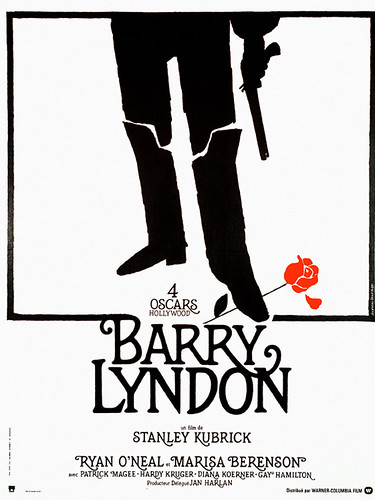From Romance to Ritual: Barry Lyndon' takes its inspiration from Thackeray's source novel. But in Kubrick's hands the tone - and the hero - are transformed.
By Kim Newman
Sight and Sound (British Film Institute)

One of the mysteries of Stanley Kubrick's career is why he seized upon William Makepeace Thackeray's The Memoirs of Barry Lyndon for adaptation, since the novel is most notable for its use of a literary device Kubrick was constitutionally unable to embrace - the unreliable narrator. In Kubrick's films, narrators (like directors) are authoritative. Humbert Humbert (James Mason) of Lolita, from Nabokov, and Alex DeLarge (Malcolm McDowell) of A Clockwork Orange, from Anthony Burgess, tell their own stories with vivid, revelatory narration. Though they talk of much that is to their discredit, they are honest chroniclers; they may work mendacious wheedles on other characters, but they do not lie to us.
The first version of Thackeray's novel was serialised as The Luck of Barry Lyndon: A Romance of the Last Century. By Fitz-Boodle in Fraser's Magazine in 1844, but was revised in 1856, whereupon its title became (deep breath): The Memoirs of Barry Lyndon, Esq., of the Kingdom of Ireland. Containing an Account of his Extraordinary Adventures; Misfortunes; His Sufferings in the Service of His Late Prussian Majesty; His Visits to Many of the Courts of Europe; His Marriage and Splendid Establishments in England and Ireland; and the Many Cruel Persecutions, Conspiracies and Slanders of Which He Has Been a Victim. In the earlier version, the narrative of Barry Lyndon (né Redmond Barry) - which purports to have been written as he is dying in Fleet Prison - is mediated by footnotes from 'Fitz-Boodle', a fictional editor who contradicts the autobiographer on points of fact. In the revised text, Fitz-Boodle is dropped: the novelist has gained confidence that readers will perceive a different picture behind Barry's statements such as: "For the first three years I never struck my wife but when I was in liquor."
Thackeray's Barry is as much of a monster as Alex, and as murderous a terror to his family as Jack Torrance in The Shining. He is a bully, swindler, looter, card-sharp, murderer, cad, spy, deserter, snob, drunkard, whiner, braggart, philistine and rake. He betrays every friend or relation, considers others' misfortunes only insofar as they affect himself and becomes a low-rent gothic villain as his captive wife pens pleas for rescue in lemon juice, between the lines of letters to her milliner. As Fitz-Boodle notes, he is also embarrassingly devoted to his own reputation, and any possible admission of low character or motive is followed by "a duel, in which he is victorious".
To Read the Rest of the Essay
No comments:
Post a Comment